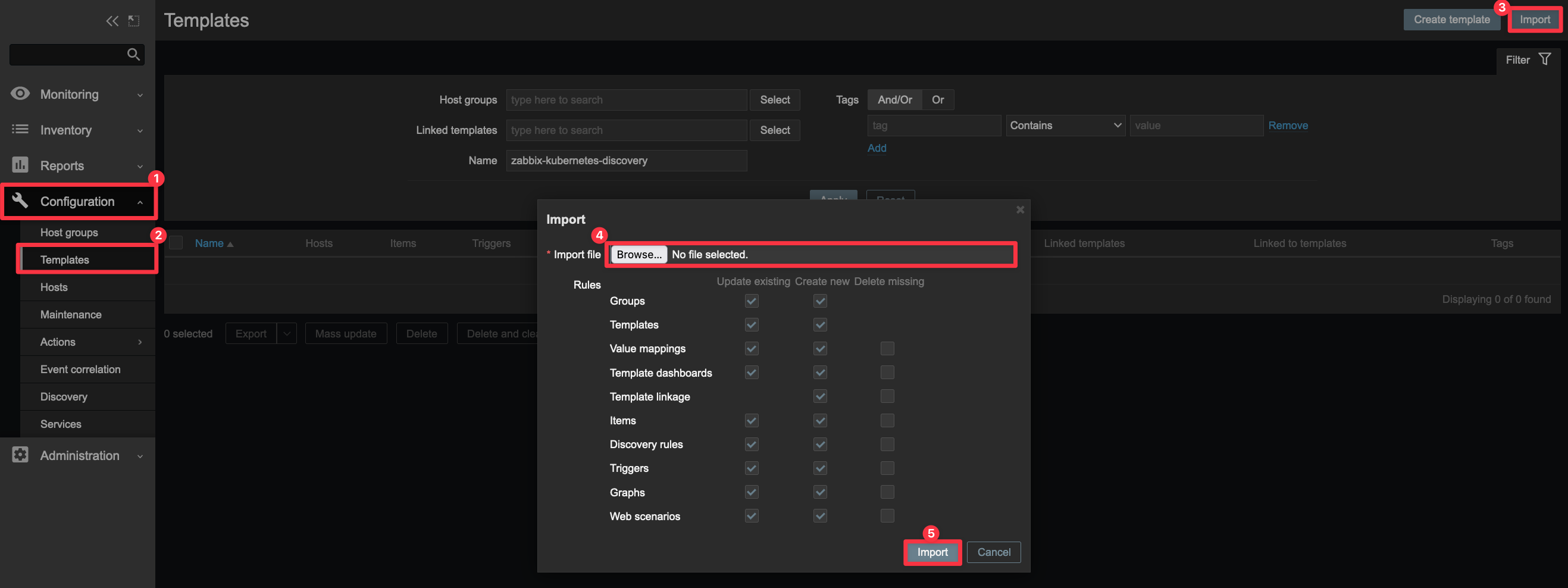Kubernetes monitoring for Zabbix with discovery objects:
- Nodes
- DaemonSets
- Deployments
- StatefulSets
- Cronjobs
- PersistentVolumeClaims
- SystemPods
Works with 2 variables only by default:
ZABBIX_ENDPOINT: Zabbix server/proxy where the datas will be sentKUBERNETES_NAME: Name of your Kubernetes cluster on Zabbix (host)
Before installation, you need to create zabbix-monitoring namespace in your cluster:
$ kubectl create namespace zabbix-monitoringAll Helm options/parameters are available in the Helm folder here.
To install the chart with the release name zabbix-kubernetes-discovery from local Helm templates:
$ helm upgrade --install zabbix-kubernetes-discovery \
./helm/zabbix-kubernetes-discovery/ \
--values ./helm/zabbix-kubernetes-discovery/values.yaml \
--namespace zabbix-monitoring \
--set namespace.name="zabbix-monitoring" \
--set environment.ZABBIX_ENDPOINT="zabbix-proxy.example.com" \
--set environment.KUBERNETES_NAME="kubernetes-cluster-example"To install the chart with the release name zabbix-kubernetes-discovery from my Helm repository:
$ helm repo add djerfy https://djerfy.github.io/helm-charts
$ helm upgrade --install zabbix-kubernetes-discovery \
djerfy/zabbix-kubernetes-discovery \
--namespace zabbix-monitoring
--set namespace.name="zabbix-monitoring" \
--set environment.ZABBIX_ENDPOINT="zabbix-proxy.example.com" \
--set environment.KUBERNETES_NAME="kubernetes-cluster-name"To uninstall/delete the zabbix-kubernetes-discovery deployment:
$ helm list -n zabbix-monitoring
$ helm delete -n zabbix-monitoring zabbix-kubernetes-discoveryThe command removes all the Kubernetes components associated with the chart and deletes the release.
usage: zabbix-kubernetes-discovery.py [-h]
[--zabbix-timeout ZABBIX_TIMEOUT]
--zabbix-endpoint ZABBIX_ENDPOINT
--kubernetes-name KUBERNETES_NAME
--monitoring-mode {volume,deployment,daemonset,node,statefulset,cronjob,systempod}
--monitoring-type {discovery,item,json}
[--object-name OBJECT_NAME]
[--match-label KEY=VALUE]
[--include-name INCLUDE_NAME]
[--include-namespace INCLUDE_NAMESPACE]
[--exclude-name EXCLUDE_NAME]
[--exclude-namespace EXCLUDE_NAMESPACE]
[--no-wait]
[--verbose]
[--debug]
Zabbix template is located in ./zabbix/ folder on this repository.
After downloading, you need to import it as below:
- Go to Configuration in menu
- And Templates
- Click Import
- Select downloaded template file
- Confirm import
- Daemonset
- Items: 4
Daemonset {#KUBERNETES_DAEMONSET_NAMESPACE}/{#KUBERNETES_DAEMONSET_NAME}: Available replicasDaemonset {#KUBERNETES_DAEMONSET_NAMESPACE}/{#KUBERNETES_DAEMONSET_NAME}: Current replicasDaemonset {#KUBERNETES_DAEMONSET_NAMESPACE}/{#KUBERNETES_DAEMONSET_NAME}: Desired replicasDaemonset {#KUBERNETES_DAEMONSET_NAMESPACE}/{#KUBERNETES_DAEMONSET_NAME}: Ready replicas
- Triggers: 5
Daemonset {#KUBERNETES_DAEMONSET_NAMESPACE}/{#KUBERNETES_DAEMONSET_NAME}: Available replicas nodataDaemonset {#KUBERNETES_DAEMONSET_NAMESPACE}/{#KUBERNETES_DAEMONSET_NAME}: Current replicas nodataDaemonset {#KUBERNETES_DAEMONSET_NAMESPACE}/{#KUBERNETES_DAEMONSET_NAME}: Desired replicas nodataDaemonset {#KUBERNETES_DAEMONSET_NAMESPACE}/{#KUBERNETES_DAEMONSET_NAME}: Ready replicas nodataDaemonset {#KUBERNETES_DAEMONSET_NAMESPACE}/{#KUBERNETES_DAEMONSET_NAME}: Problem items nodata
- Graphs: 1
Daemonset {#KUBERNETES_DAEMONSET_NAMESPACE}/{#KUBERNETES_DAEMONSET_NAME}: Graph replicas
- Items: 4
- Deployment
- Items: 3
Deployment {#KUBERNETES_DEPLOYMENT_NAMESPACE}/{#KUBERNETES_DEPLOYMENT_NAME}: Available replicasDeployment {#KUBERNETES_DEPLOYMENT_NAMESPACE}/{#KUBERNETES_DEPLOYMENT_NAME}: Desired replicasDeployment {#KUBERNETES_DEPLOYMENT_NAMESPACE}/{#KUBERNETES_DEPLOYMENT_NAME}: Ready replicas
- Triggers: 5
Deployment {#KUBERNETES_DEPLOYMENT_NAMESPACE}/{#KUBERNETES_DEPLOYMENT_NAME}: Available replicas nodataDeployment {#KUBERNETES_DEPLOYMENT_NAMESPACE}/{#KUBERNETES_DEPLOYMENT_NAME}: Desired replicas nodataDeployment {#KUBERNETES_DEPLOYMENT_NAMESPACE}/{#KUBERNETES_DEPLOYMENT_NAME}: Ready replicas nodataDeployment {#KUBERNETES_DEPLOYMENT_NAMESPACE}/{#KUBERNETES_DEPLOYMENT_NAME}: Problem items nodataDeployment {#KUBERNETES_DEPLOYMENT_NAMESPACE}/{#KUBERNETES_DEPLOYMENT_NAME}: Problem number of replicas
- Graphs: 1
Deployment {#KUBERNETES_DEPLOYMENT_NAMESPACE}/{#KUBERNETES_DEPLOYMENT_NAME}: Graph replicas
- Items: 3
- Statefulset
- Items: 3
Statefulset {#KUBERNETES_STATEFULSET_NAMESPACE}/{#KUBERNETES_STATEFULSET_NAME}: Available replicasStatefulset {#KUBERNETES_STATEFULSET_NAMESPACE}/{#KUBERNETES_STATEFULSET_NAME}: Desired replicasStatefulset {#KUBERNETES_STATEFULSET_NAMESPACE}/{#KUBERNETES_STATEFULSET_NAME}: Ready replicas
- Triggers: 5
Statefulset {#KUBERNETES_STATEFULSET_NAMESPACE}/{#KUBERNETES_STATEFULSET_NAME}: Available replicas nodataStetafulset {#KUBERNETES_STATEFULSET_NAMESPACE}/{#KUBERNETES_STATEFULSET_NAME}: Desired replicas nodataStatefulset {#KUBERNETES_STATEFULSET_NAMESPACE}/{#KUBERNETES_STATEFULSET_NAME}: Ready replicas nodataStatefulset {#KUBERNETES_STATEFULSET_NAMESPACE}/{#KUBERNETES_STATEFULSET_NAME}: Problem items nodataStatefulset {#KUBERNETES_STATEFULSET_NAMESPACE}/{#KUBERNETES_STATEFULSET_NAME}: Problem number of replicas
- Graphs: 1
Deployment {#KUBERNETES_STATEFULSET_NAMESPACE}/{#KUBERNETES_STATEFULSET_NAME}: Graph replicas
- Items: 3
- Cronjob
- Items: 3
Cronjob {#KUBERNETES_CRONJOB_NAMESPACE}/{#KUBERNETES_CRONJOB_NAME}: Job exitcodeCronjob {#KUBERNETES_CRONJOB_NAMESPACE}/{#KUBERNETES_CRONJOB_NAME}: Job restartCronjob {#KUBERNETES_CRONJOB_NAMESPACE}/{#KUBERNETES_CRONJOB_NAME}: Job reason
- Triggers: 5
Cronjob {#KUBERNETES_CRONJOB_NAMESPACE}/{#KUBERNETES_CRONJOB_NAME}: Job exitcode nodataCronjob {#KUBERNETES_CRONJOB_NAMESPACE}/{#KUBERNETES_CRONJOB_NAME}: Job restart nodataCronjob {#KUBERNETES_CRONJOB_NAMESPACE}/{#KUBERNETES_CRONJOB_NAME}: Job reason nodataCronjob {#KUBERNETES_CRONJOB_NAMESPACE}/{#KUBERNETES_CRONJOB_NAME}: Problem items nodataCronjob {#KUBERNETES_CRONJOB_NAMESPACE}/{#KUBERNETES_CRONJOB_NAME}: Problem last job
- Graphs: 1
Cronjob {#KUBERNETES_CRONJOB_NAMESPACE}/{#KUBERNETES_CRONJOB_NAME}: Graph jobs
- Items: 3
- Node
- Items: 8
Node {#KUBERNETES_NODE_NAME}: Allocatable cpuNode {#KUBERNETES_NODE_NAME}: Allocatable memoryNode {#KUBERNETES_NODE_NAME}: Allocatable podsNode {#KUBERNETES_NODE_NAME}: Capacity cpuNode {#KUBERNETES_NODE_NAME}: Capacity memoryNode {#KUBERNETES_NODE_NAME}: Capacity podsNode {#KUBERNETES_NODE_NAME}: Current podsNode {#KUBERNETES_NODE_NAME}: Healthz
- Triggers: 8
Node {#KUBERNETES_NODE_NAME}: Allocatable pods nodataNode {#KUBERNETES_NODE_NAME}: Capacity pods nodataNode {#KUBERNETES_NODE_NAME}: Current pods nodataNode {#KUBERNETES_NODE_NAME}: Problem pods limits warningNode {#KUBERNETES_NODE_NAME}: Problem pods limits criticalNode {#KUBERNETES_NODE_NAME}: Health nodataNode {#KUBERNETES_NODE_NAME}: Health problemNode {#KUBERNETES_NODE_NAME}: Problem items nodata
- Graphs: 1
Node {#KUBERNETES_NODE_NAME}: Graph pods
- Items: 8
- VolumeClaim
- Items: 6
Volume {#KUBERNETES_PVC_NAMESPACE}/{#KUBERNETES_PVC_NAME}: Available bytesVolume {#KUBERNETES_PVC_NAMESPACE}/{#KUBERNETES_PVC_NAME}: Capacity bytesVolume {#KUBERNETES_PVC_NAMESPACE}/{#KUBERNETES_PVC_NAME}: Capacity inodesVolume {#KUBERNETES_PVC_NAMESPACE}/{#KUBERNETES_PVC_NAME}: Free inodesVolume {#KUBERNETES_PVC_NAMESPACE}/{#KUBERNETES_PVC_NAME}: Used bytesVolume {#KUBERNETES_PVC_NAMESPACE}/{#KUBERNETES_PVC_NAME}: Used inodes
- Triggers: 11
Volume {#KUBERNETES_PVC_NAMESPACE}/{#KUBERNETES_PVC_NAME}: Available bytes nodataVolume {#KUBERNETES_PVC_NAMESPACE}/{#KUBERNETES_PVC_NAME}: Capacity bytes nodataVolume {#KUBERNETES_PVC_NAMESPACE}/{#KUBERNETES_PVC_NAME}: Capacity inodes nodataVolume {#KUBERNETES_PVC_NAMESPACE}/{#KUBERNETES_PVC_NAME}: Consumption bytes criticalVolume {#KUBERNETES_PVC_NAMESPACE}/{#KUBERNETES_PVC_NAME}: Consumption bytes warningVolume {#KUBERNETES_PVC_NAMESPACE}/{#KUBERNETES_PVC_NAME}: Consumption inodes criticalVolume {#KUBERNETES_PVC_NAMESPACE}/{#KUBERNETES_PVC_NAME}: Consumption inodes warningVolume {#KUBERNETES_PVC_NAMESPACE}/{#KUBERNETES_PVC_NAME}: Free inodes nodataVolume {#KUBERNETES_PVC_NAMESPACE}/{#KUBERNETES_PVC_NAME}: Used bytes nodataVolume {#KUBERNETES_PVC_NAMESPACE}/{#KUBERNETES_PVC_NAME}: Used inodes nodataVolume {#KUBERNETES_PVC_NAMESPACE}/{#KUBERNETES_PVC_NAME}: Problem items nodata
- Graphs: 2
Volume {#KUBERNETES_PVC_NAMESPACE}/{#KUBERNETES_PVC_NAME}: Graph bytesVolume {#KUBERNETES_PVC_NAMESPACE}/{#KUBERNETES_PVC_NAME}: Graph inodes
- Items: 6
- Systempod
- Items: 2
Systempod {#KUBERNETES_SYSTEMPOD_NAMESPACE}/{#KUBERNETES_SYSTEMPOD_NAME}: Desired podSystempod {#KUBERNETES_SYSTEMPOD_NAMESPACE}/{#KUBERNETES_SYSTEMPOD_NAME}: Running pod
- Triggers: 2
Systempod {#KUBERNETES_SYSTEMPOD_NAMESPACE}/{#KUBERNETES_SYSTEMPOD_NAME}: Problem items nodataSystempod {#KUBERNETES_SYSTEMPOD_NAMESPACE}/{#KUBERNETES_SYSTEMPOD_NAME}: Problem pod
- Graphs: 1
Systempod {#KUBERNETES_SYSTEMPOD_NAMESPACE}/{#KUBERNETES_SYSTEMPOD_NAME}: Graph status
- Items: 2
You can build Docker image manually like this:
$ docker build -t zabbix-kubernetes-discovery .All contributions are welcome! Please fork the main branch, create a new branch and then create a pull request.








